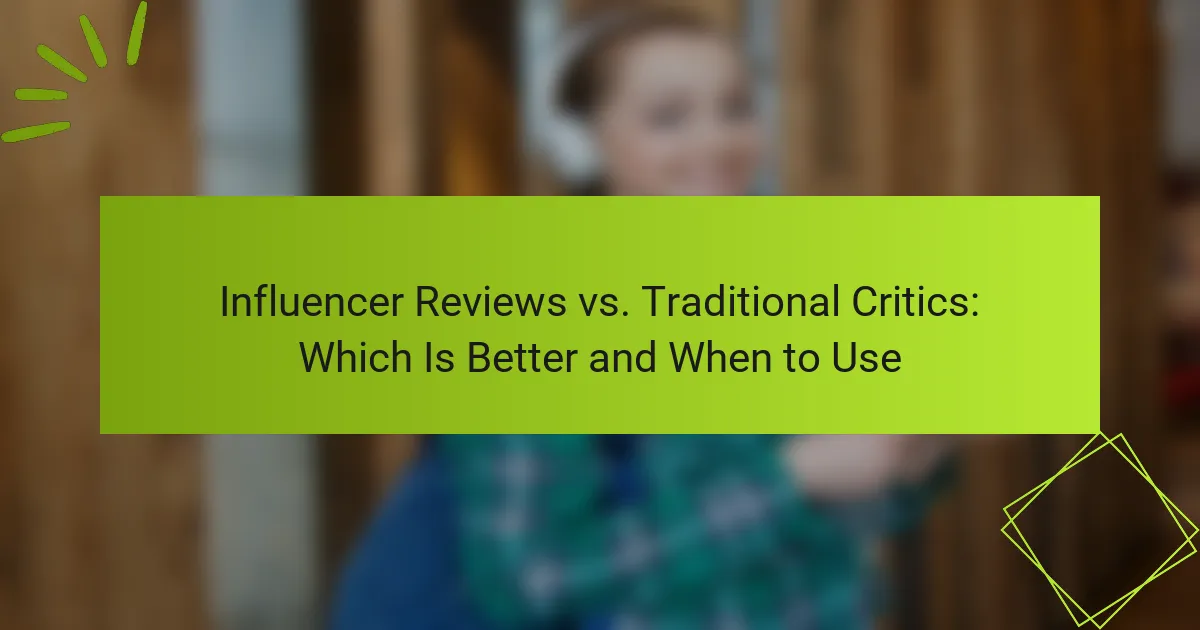In the evolving landscape of product evaluation, influencer reviews and traditional critics each serve distinct purposes. Influencer reviews excel in connecting with niche audiences through relatable and authentic engagement, while traditional critics provide comprehensive analyses backed by expertise and established credibility. Understanding when to leverage each can enhance marketing strategies and consumer trust.

When should you choose influencer reviews over traditional critics?
Choose influencer reviews when targeting specific niche audiences or when seeking authentic engagement. Traditional critics are better for comprehensive analysis and broader appeal, especially for mainstream products.
Influencer reviews for niche audiences
Influencer reviews excel in reaching niche markets where specialized knowledge and personal connection matter. For instance, a beauty influencer may provide insights on a new skincare product that resonates with followers interested in organic ingredients. This targeted approach can drive higher engagement and conversion rates within specific communities.
When selecting influencers, consider their audience demographics and interests to ensure alignment with your product. Collaborating with micro-influencers can be particularly effective, as they often have loyal followings and higher engagement rates compared to larger influencers.
Traditional critics for comprehensive analysis
Traditional critics offer in-depth analysis and context that can be crucial for complex products, such as technology or literature. Their reviews often include comparisons with similar products, performance metrics, and expert opinions, providing a well-rounded perspective. For example, a tech magazine might evaluate a new smartphone’s features against its competitors, helping consumers make informed decisions.
Utilizing traditional critics is beneficial when launching products that require detailed evaluations, as their credibility can enhance consumer trust. However, keep in mind that their reviews may not always reach niche audiences effectively.
Timing based on product launch
The timing of reviews can significantly impact their effectiveness. For new product launches, influencer reviews can generate buzz and excitement quickly, leveraging social media platforms for immediate visibility. This approach is particularly useful for seasonal products or trends that require timely promotion.
In contrast, traditional critics may take longer to publish their reviews due to thorough evaluation processes. If your product is entering a competitive market, consider prioritizing influencer reviews initially, followed by traditional critiques for sustained visibility.
Target demographic preferences
Understanding your target demographic is essential when deciding between influencer reviews and traditional critics. Younger audiences often prefer influencer content due to its relatable and informal nature, while older consumers may trust traditional critics for their authority and expertise.
To maximize impact, analyze your audience’s media consumption habits. If they engage more with social media, influencer reviews may be more effective. Conversely, if they rely on established publications for product information, traditional critics should be prioritized.

What are the benefits of influencer reviews?
Influencer reviews offer a unique blend of authenticity and personal connection, making them highly effective in today’s marketing landscape. They resonate particularly well with audiences seeking relatable opinions and experiences before making purchasing decisions.
Authenticity and relatability
Influencer reviews are often perceived as more genuine compared to traditional critic reviews. Influencers typically share personal stories and experiences with products, which can create a sense of trust among their followers. This relatability encourages potential buyers to feel more confident in their purchasing choices.
When selecting an influencer, consider their authenticity in relation to your brand. Choose someone whose values align with your product to enhance credibility. Authentic endorsements can significantly impact consumer behavior, leading to higher conversion rates.
Engagement with younger audiences
Influencer reviews are particularly effective in reaching younger demographics, such as Millennials and Gen Z. These groups often prefer peer recommendations over traditional advertising, making influencer marketing a powerful tool for brands targeting these audiences. Engaging content from influencers can capture attention more effectively than conventional ads.
To maximize engagement, collaborate with influencers who have a strong following among your target age group. Tailor your messaging to resonate with their interests and values, ensuring that the content feels relevant and appealing.
Social media reach and virality
Influencer reviews can achieve significant social media reach, often leading to viral content. When influencers share their experiences with products, their posts can be shared widely, amplifying brand visibility. This organic reach can be more impactful than traditional advertising methods.
To leverage this potential, encourage influencers to create engaging and shareable content, such as videos or interactive posts. Monitor engagement metrics to identify which types of content resonate most with audiences, allowing you to refine your influencer strategy for better results.

What are the advantages of traditional critics?
Traditional critics offer several advantages, including their expertise, in-depth analysis, and established reputation. These factors contribute to a more reliable and thorough evaluation of products, services, or performances.
Expertise and credibility
Traditional critics often have extensive training or experience in their respective fields, which enhances their credibility. Their background allows them to provide insights that casual reviewers may overlook, ensuring a more informed perspective.
For instance, a film critic with a degree in film studies can analyze cinematography and narrative structure more effectively than a general audience member. This expertise helps consumers make better-informed decisions based on nuanced evaluations.
In-depth analysis and context
Traditional critics typically offer in-depth analysis that goes beyond surface-level observations. They provide context regarding historical significance, genre conventions, and technical aspects that enrich the understanding of the subject.
For example, a restaurant review might discuss not only the taste of the food but also the chef’s culinary philosophy and the restaurant’s place within the local dining scene. This comprehensive approach helps consumers grasp the bigger picture.
Established reputation in the industry
Critics often have an established reputation, which can lend weight to their reviews. Their opinions may carry more influence due to their long-standing presence in the industry and relationships with creators.
Consumers may trust a well-known critic’s review over an unknown influencer’s opinion, especially when making significant purchases, such as concert tickets or luxury goods. This trust can guide consumers toward quality choices and away from potential disappointments.

How do influencer reviews impact purchasing decisions?
Influencer reviews significantly sway purchasing decisions by leveraging trust and relatability. Consumers often view influencers as credible sources, making their endorsements more persuasive than traditional advertising methods.
Higher conversion rates through trust
Influencer reviews can lead to higher conversion rates due to the trust that followers place in their recommendations. When an influencer shares their positive experience with a product, their audience is more likely to consider purchasing it, often resulting in conversion rates that can exceed traditional marketing methods by substantial margins.
Brands that collaborate with influencers typically see a boost in sales, especially when the influencer’s audience aligns with the brand’s target market. For instance, beauty products endorsed by makeup artists can achieve conversion rates in the double digits, compared to lower rates for standard ads.
Influence on social proof
Influencer reviews contribute to social proof, which is the psychological phenomenon where people look to others’ behaviors to determine their own. When potential buyers see influencers using and endorsing a product, it creates a sense of validation and encourages them to follow suit.
This effect is particularly strong on social media platforms where users can see real-time engagement, such as likes and comments. A product that has been positively reviewed by multiple influencers can quickly gain traction and become a trend, leading to increased sales.
Emotional connection with the audience
Influencers often cultivate a personal connection with their followers, which enhances the impact of their reviews. This emotional bond makes their recommendations feel more genuine and relatable, prompting followers to trust their opinions more than those of traditional critics.
For example, an influencer sharing a heartfelt story about how a product improved their life can resonate deeply with their audience, leading to a stronger likelihood of purchase. Brands should consider this emotional aspect when selecting influencers to ensure alignment with their values and target demographics.

How do traditional critics affect brand perception?
Traditional critics significantly shape brand perception by providing expert evaluations that consumers often trust. Their reviews can enhance credibility and influence purchasing decisions, especially in industries like film, food, and fashion.
Setting industry standards
Traditional critics play a crucial role in establishing benchmarks for quality within various sectors. Their assessments often highlight what constitutes excellence, guiding both consumers and brands in their expectations.
For instance, a restaurant receiving a high rating from a well-known food critic may see an increase in patronage, as diners often seek assurance of quality. Similarly, a film that garners positive reviews from established critics can attract larger audiences, as these reviews serve as a form of validation.
Brands should consider engaging with critics to understand the standards they uphold. This can help businesses align their offerings with industry expectations, ultimately enhancing their reputation and consumer trust.



